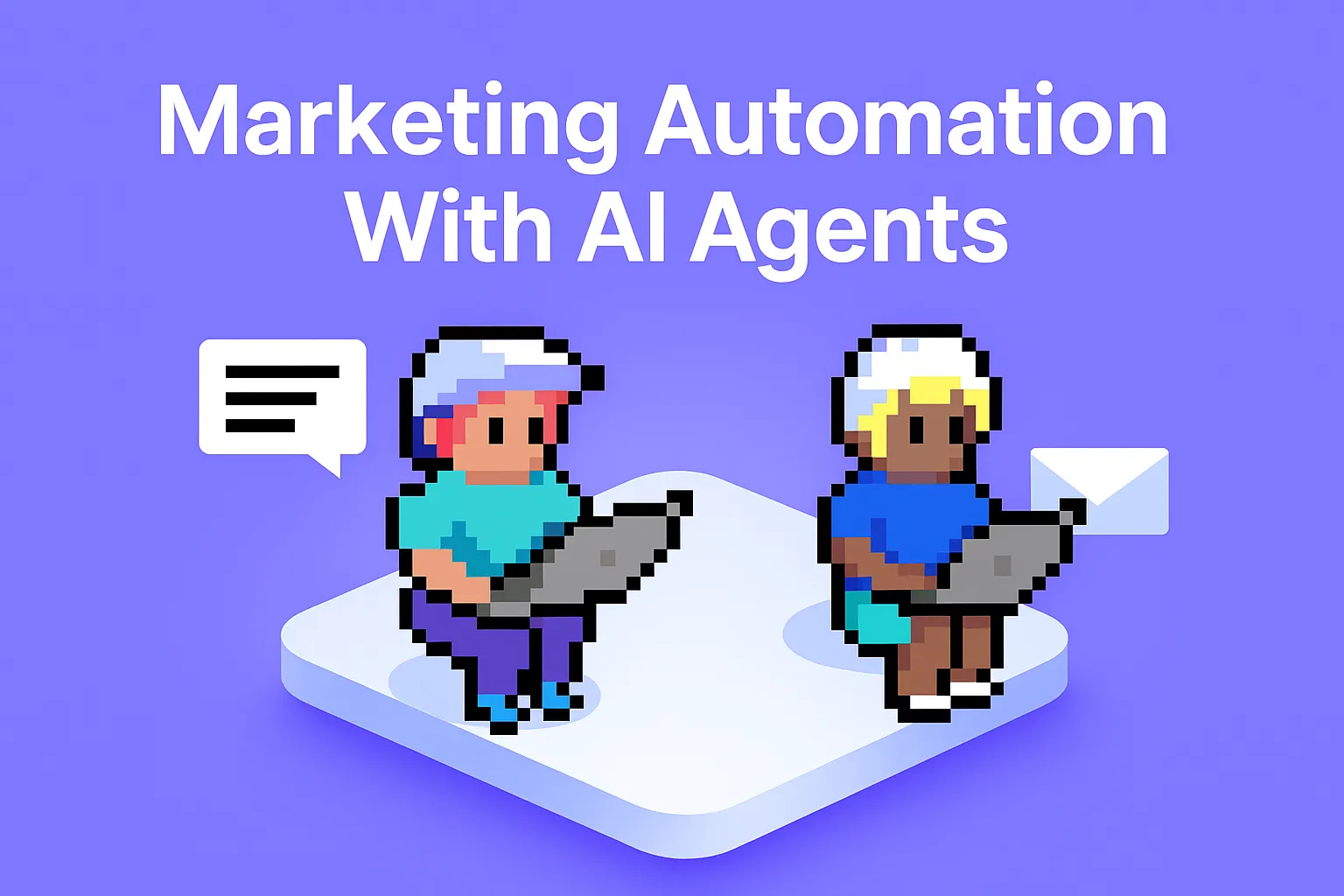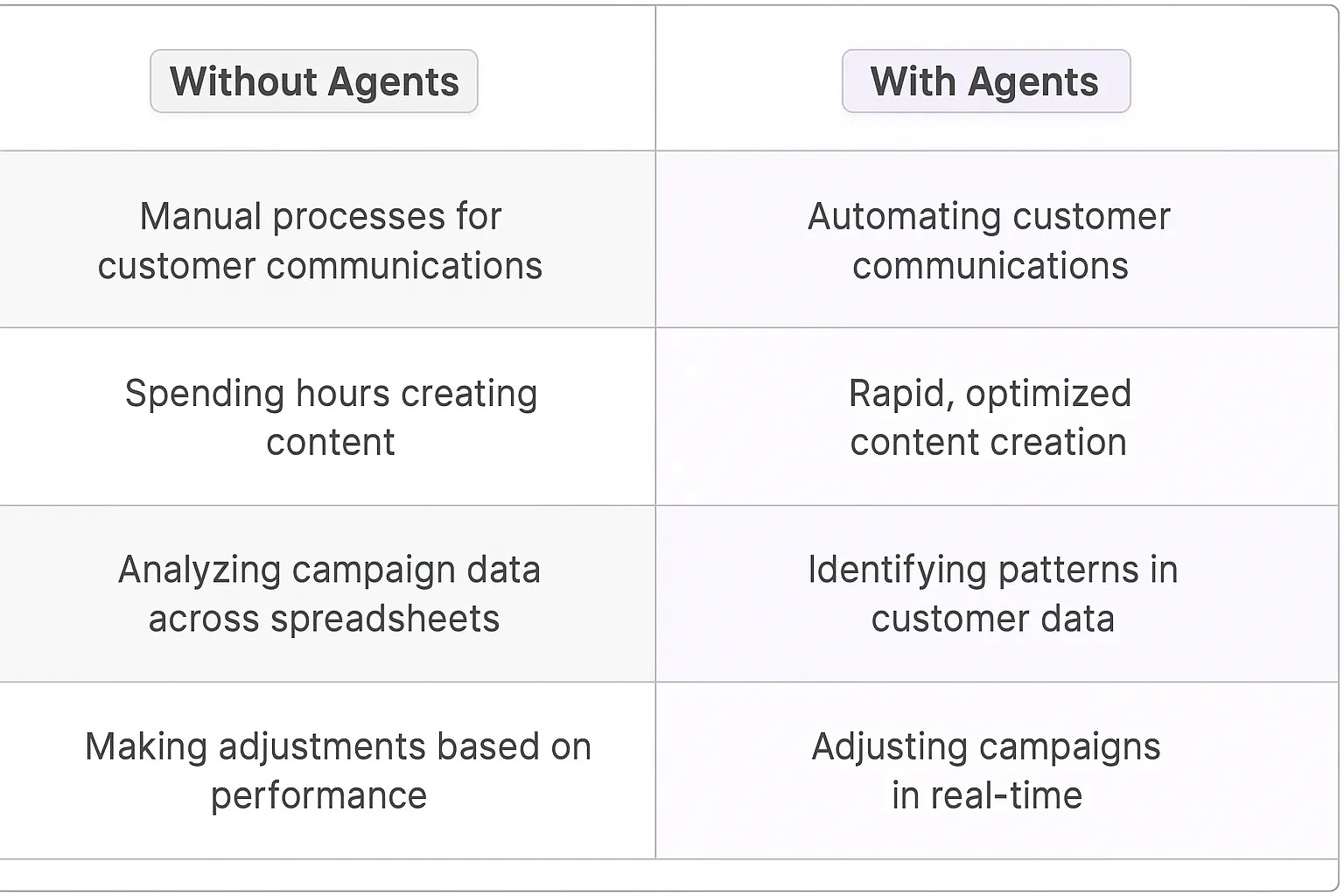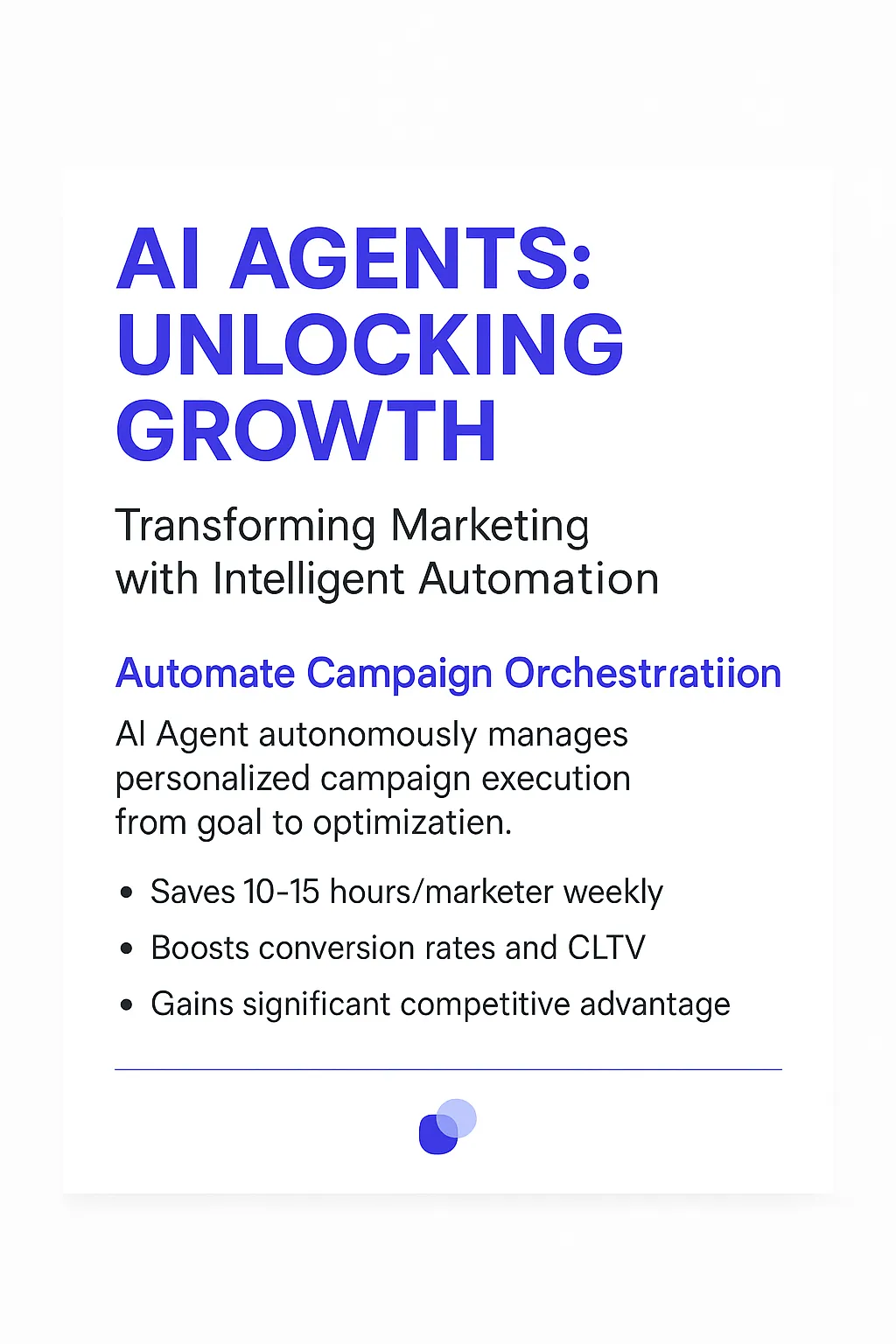Ortto
Understanding Ortto's Marketing Automation Platform
Ortto is a comprehensive marketing automation platform that combines customer data, engagement tools, and AI capabilities into a unified system. The platform enables businesses to create sophisticated marketing campaigns, track customer journeys, and deliver personalized experiences across multiple channels. By integrating AI Agents into its core functionality, Ortto has evolved beyond traditional marketing automation into an intelligent system that learns and adapts to improve marketing outcomes.
The platform stands out through its sophisticated data analytics capabilities, advanced segmentation tools, and multi-channel campaign management features. Its AI-powered content creation engine generates on-brand messaging while the predictive analytics system identifies high-value opportunities. The customer journey mapping tools provide deep insights into behavior patterns, while automated testing capabilities continuously optimize campaign performance.

Benefits of AI Agents for Ortto
What would have been used before AI Agents?
Marketing teams traditionally relied on complex manual processes to manage customer communications in Ortto. They spent countless hours writing email sequences, segmenting audiences, and analyzing campaign performance data. The process involved multiple team members coordinating across spreadsheets, copying and pasting content, and making educated guesses about optimal send times and messaging.
What are the benefits of AI Agents?
AI Agents transform how marketing teams operate within Ortto by bringing intelligence and automation to previously manual tasks. These digital teammates analyze vast amounts of customer interaction data to identify patterns and opportunities that humans might miss.
The agents excel at rapid content creation and optimization - they can generate entire email sequences optimized for different audience segments while maintaining brand voice consistency. They continuously monitor campaign performance metrics and make real-time adjustments to improve open rates and engagement.
A key advantage is the agents' ability to process and act on data at scale. They can simultaneously track thousands of customer journeys, identify behavioral triggers, and automatically adjust messaging and timing for maximum impact. This level of personalization would be impossible to achieve manually.
The network effects are particularly powerful - as more marketing teams use AI Agents in Ortto, the systems learn from aggregate performance data to become increasingly sophisticated at predicting what messaging and tactics will resonate with different audience segments.
For growth teams focused on rapid experimentation, the agents dramatically accelerate testing cycles by automatically generating variants, analyzing results, and implementing winning approaches. This creates a continuous optimization loop that drives steadily improving performance over time.
Most importantly, AI Agents free up marketing teams to focus on high-level strategy and creative direction rather than getting bogged down in tactical execution. The technology handles the heavy lifting while humans guide the overall approach.

Potential Use Cases of AI Agents with Ortto
Marketing Campaign Optimization
AI Agents analyze customer behavior patterns across Ortto's marketing automation platform, identifying optimal send times and content personalization opportunities. The agents continuously learn from engagement metrics to refine email sequences and cross-channel messaging strategies, leading to higher conversion rates and customer retention.
Customer Journey Mapping
Digital teammates monitor customer touchpoints throughout the Ortto ecosystem, constructing detailed journey maps that reveal critical interaction patterns. They identify drop-off points and engagement opportunities, enabling marketers to create more effective nurture paths and targeted interventions.
Content Personalization at Scale
AI Agents tap into Ortto's customer data platform to segment audiences with surgical precision. They generate tailored content variations based on behavioral signals, purchase history, and engagement patterns - delivering the right message to each customer segment without manual intervention.
Predictive Analytics Implementation
The AI system processes vast amounts of customer data within Ortto to forecast future behaviors and trends. Marketers gain actionable insights about which customers are likely to churn, who's ready to purchase, and which products to recommend - enabling proactive engagement strategies.
Automated A/B Testing
AI Agents orchestrate sophisticated multivariate tests across email campaigns, landing pages, and other marketing assets. They analyze performance in real-time, automatically directing more traffic to winning variations while continuously experimenting with new optimizations.
Customer Service Enhancement
Digital teammates analyze support tickets and customer communications to identify common issues and sentiment patterns. They suggest response templates, route inquiries to appropriate team members, and help maintain consistent service quality across all channels.
Campaign Performance Analysis
AI Agents dive deep into marketing metrics, surfacing meaningful patterns and correlations that human analysts might miss. They generate detailed performance reports with actionable recommendations for improving campaign effectiveness and ROI.
Lead Scoring Refinement
The AI system continuously updates lead scoring models based on evolving customer behaviors and conversion patterns. It identifies new predictive indicators of purchase intent and adjusts scoring criteria automatically to maintain accuracy over time.

Industry Use Cases
AI agents in Ortto unlock powerful capabilities across multiple sectors, each with its own unique challenges and opportunities. The real magic happens when these digital teammates adapt to industry-specific contexts, transforming how teams operate. From retail brands optimizing customer engagement to SaaS companies refining their product messaging, the applications are both diverse and impactful.
What makes Ortto's AI implementation particularly interesting is how it scales personalization while maintaining authenticity in customer communications. Marketing teams in different verticals leverage these capabilities in distinct ways - some focus on behavioral analysis and segmentation, while others emphasize content creation and campaign optimization.
The following industry examples demonstrate how organizations are integrating Ortto's AI capabilities into their core operations, creating more responsive and data-driven customer experiences. Each case reveals unique patterns of implementation and measurable outcomes that showcase the practical impact of AI in real-world business scenarios.
E-commerce Growth Optimization with Ortto AI
E-commerce businesses face the constant challenge of converting browsing sessions into sales while maintaining customer loyalty in an increasingly competitive landscape. Ortto's AI capabilities transform how online retailers handle the complexity of modern e-commerce operations.
Take an online fashion retailer managing thousands of SKUs across multiple categories. The Ortto AI analyzes real-time customer behavior patterns, identifying which products specific customer segments are most likely to purchase based on their browsing history, past purchases, and similar customer profiles. This granular understanding enables the creation of highly targeted product recommendations that feel personal rather than automated.
The AI's predictive capabilities extend beyond basic product recommendations. By analyzing seasonal trends, inventory levels, and customer purchase patterns, it can automatically adjust email campaign timing and content to maximize impact. For example, when the AI detects a customer segment showing high interest in winter coats during early fall, it triggers personalized campaigns before the peak season hits, capturing early-bird shoppers while inventory levels are optimal.
What's particularly powerful is the AI's ability to identify and act on cart abandonment patterns. Instead of sending generic recovery emails, the system analyzes why specific customers typically abandon carts - whether it's shipping costs, price sensitivity, or product uncertainty. It then tailors recovery messages accordingly, perhaps offering free shipping to shipping-sensitive customers or product comparison guides to those showing uncertainty.
The results speak for themselves: retailers using Ortto's AI capabilities typically see a 23-35% reduction in cart abandonment rates and a 40% improvement in email campaign engagement. These aren't just incremental gains - they represent a fundamental shift in how e-commerce businesses understand and respond to customer behavior.
SaaS Customer Success Transformation Through Ortto AI
The SaaS industry's biggest challenge isn't just acquiring customers - it's keeping them. Customer success teams often struggle to identify at-risk accounts before it's too late, leading to unexpected churn and lost revenue. Ortto's AI transforms this dynamic by creating a proactive, data-driven approach to customer retention.
A mid-market B2B SaaS company serving 5,000+ customers demonstrates the power of this approach. The Ortto AI analyzes thousands of customer touchpoints - product usage patterns, support tickets, NPS scores, and engagement metrics - to build comprehensive health scores that actually mean something. Unlike traditional models that rely on lagging indicators, this AI identifies subtle patterns that human analysts might miss.
The system spots behavioral shifts that correlate with churn risk - like declining feature usage in specific user segments or changes in support ticket frequency. When the AI detects these patterns, it triggers targeted interventions through the most effective channels for each customer segment. Technical users might receive advanced feature tutorials, while business users get ROI-focused content.
Most impressive is the AI's ability to predict expansion opportunities. By analyzing usage patterns across similar customer cohorts, it identifies accounts ready for upsell conversations with remarkable precision. For example, when teams consistently hit their usage limits or access advanced features frequently, the AI flags these accounts for sales outreach with specific upgrade recommendations.
The metrics tell a compelling story: SaaS companies implementing Ortto's AI see average churn rates drop by 32% within the first six months. Even more striking, their expansion revenue typically increases by 45% through better-timed, more relevant upsell conversations. This isn't just about saving at-risk customers - it's about fundamentally transforming how SaaS companies grow their customer base.
Considerations and Challenges
Implementing Ortto AI agents requires careful planning and strategic thinking around several key areas. Organizations need to evaluate their readiness across multiple dimensions before deployment.
Technical Infrastructure Requirements
The foundation for successful Ortto AI integration starts with robust technical infrastructure. Organizations need sufficient API capacity to handle increased requests, proper data storage solutions, and reliable network connectivity. Legacy systems may require updates or replacements to ensure compatibility with Ortto's AI capabilities.
Data Quality and Governance
Clean, well-structured data is critical for Ortto AI agents to function effectively. Organizations must establish clear data governance policies, implement proper data validation processes, and maintain consistent data formatting across systems. Poor data quality can lead to inaccurate insights and reduced AI performance.
Security and Compliance
Organizations handling sensitive customer data need robust security measures when implementing Ortto AI agents. This includes encryption protocols, access controls, and compliance with regulations like GDPR and CCPA. Regular security audits and updates become essential parts of the maintenance routine.
Change Management
The introduction of AI agents often faces resistance from teams comfortable with existing workflows. Organizations need comprehensive training programs, clear communication about AI capabilities and limitations, and strategies to address concerns about job displacement. Success requires building trust and demonstrating tangible benefits to end users.
Resource Allocation
Proper implementation demands dedicated resources for setup, monitoring, and optimization. Organizations must consider both initial deployment costs and ongoing maintenance expenses. This includes technical staff training, potential consulting fees, and infrastructure upgrades.
Performance Monitoring
Establishing clear metrics for success and implementing robust monitoring systems helps track AI agent performance. Organizations need to develop frameworks for measuring ROI, user satisfaction, and system accuracy. Regular performance reviews enable continuous improvement and optimization.
Understanding these challenges helps organizations develop comprehensive implementation strategies that address potential pitfalls while maximizing the benefits of Ortto AI agents.
AI-Driven Marketing Evolution
The integration of AI Agents within Ortto marks a significant shift in marketing automation capabilities. These digital teammates don't just automate tasks - they bring intelligence and adaptability to marketing operations. The technology's ability to process vast amounts of data, identify patterns, and make real-time adjustments creates a new paradigm for marketing teams. As AI capabilities continue to evolve, organizations that effectively leverage these tools will gain significant competitive advantages in their market segments.













